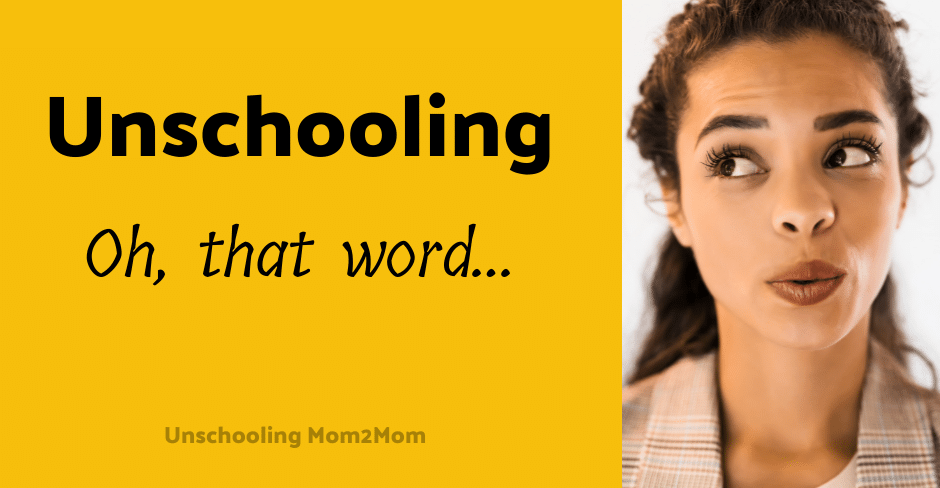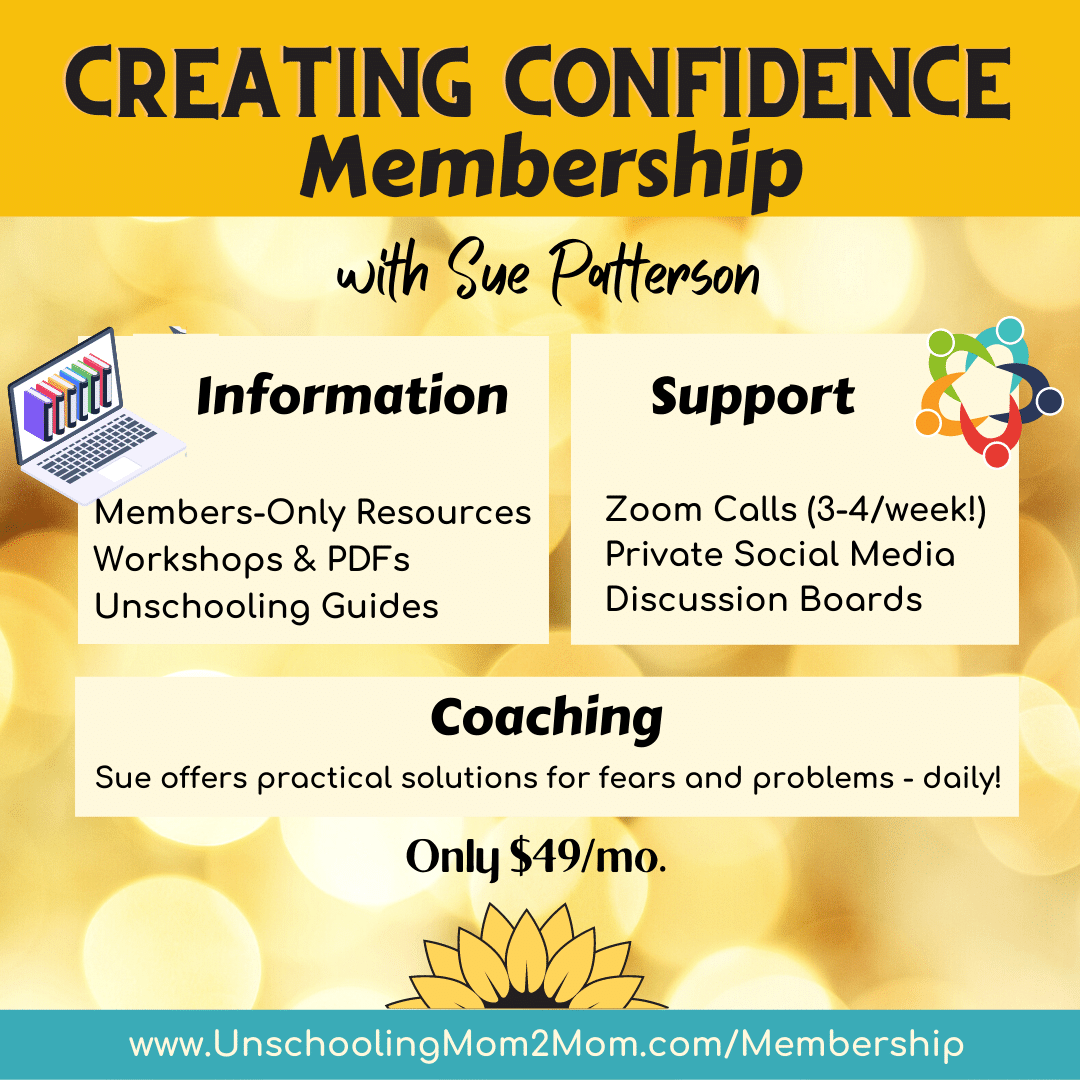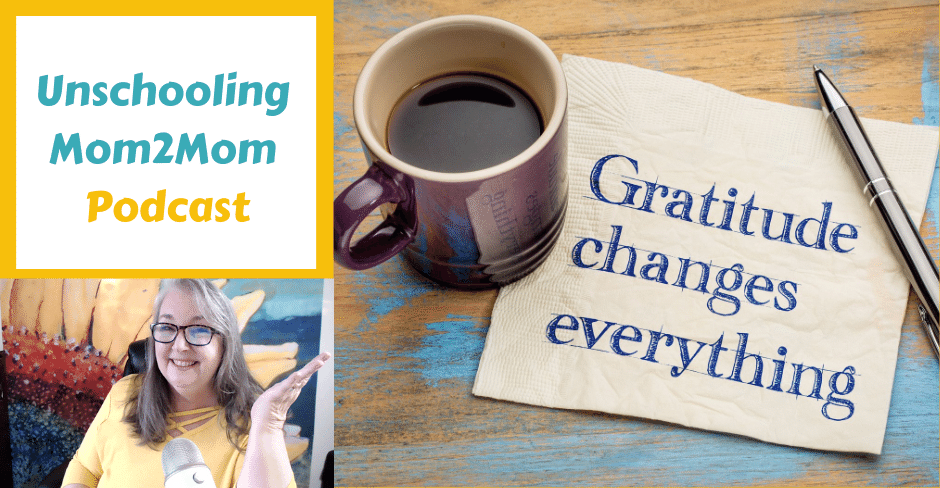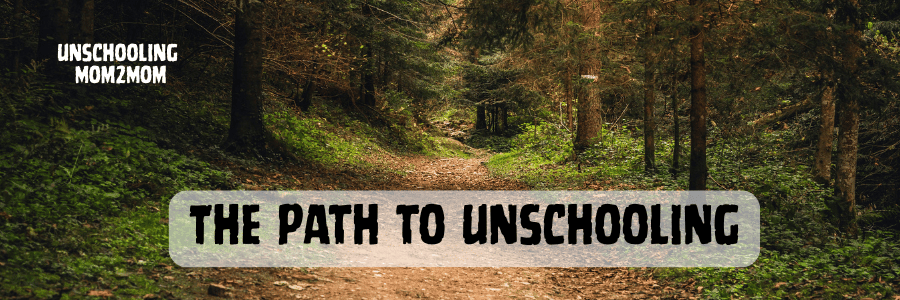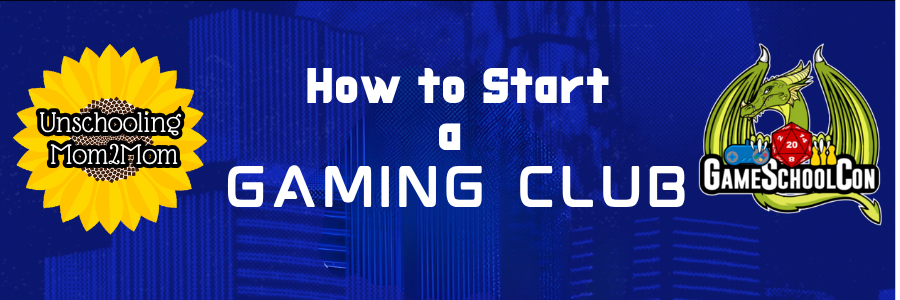That Word, Unschooling
Listen
Or Watch
That Word, Unschooling, bothers a lot of people!
Here's the thing... you don't have to use it!
But I want to invite you to think about what the problem is.
Truthfully, I had some issues with it initially. And even more with some of the alternatives that others have put forward. I'll share them with you, with a few thoughts on some of them. You can tell me in the comments if you agree or disagree. It's all ok!
Don't Like the Prefix
One of the first arguments is that words starting with UN- prefix are perceived to be negative. People didn't like putting a negative spin on such a positive concept. This wasn't one of my initial concerns because I could immediately come up with dozens of words that used the UN- prefix, but were quite positive.
The origin of using that UN- prefix comes from John Holt using the term based on a 7-Up commercial in the 1970's. The actor, Geoffrey Holder referred to this clear soft drink as The Un-Cola. It was a fun spin on something society was thinking about positively - and that laugh! Loved him! I can see wanting to tie in to something like that.
John Holt went on to use the term in his magazine, Growing Without Schooling. You can actually read back issues of the magazine here. About the word, in 1977, he said it will mean taking children out of school. Plain and simple... kind of like this commercial:
Don't like the "-schooling" part
I get it. This was the part I wasn't crazy about.
Nothing in our lives related to school - except our label.
As we came to embrace unschooling, we truly lived as if school did not exist.
But not so, with most of the world.
Most of society sends their kids off to school. And if words are used to communicate - more than simply label - then it has value to use it. It doesn't change what WE do in our homes. At all.
Decades of Discussion
Over the years, through magazines, email lists, and now social media, parents have shared their dislike for the word, unschooling. And as time has progressed (since the 90s when we started our home education journey) various people have become associated with the word, unschooling. While they've offered ideas to people who had never considered some of these more natural ways kids (all humans, really!), some were more "liked" than others.
I only bring this up because when someone hears something negative (true or untrue) in a homeschooling circle about a particular person associated with unschooling - then people think of unschooling negatively too. Throwing the baby out with the bathwater, so to speak. And that's unfortunate.
About those Critics
I was speaking at a conference years ago, and a mom said,
"I love the idea of unschooling, but I can't stand the word! Do I have to use it?"
Absolutely not!
But as we talked, she clarified that it seemed too "in your face" for her to share with family members and friends who already thought leaving the school system to homeschool was radical enough! Calling themselves unschoolers would set them up for all sorts of eye-rolling and ridicule.
A lot of this is part of the discomfort of stepping out on your own, walking away from conformity.
Fear wants us to stay safe, avoid any kinds of confrontations.
It's probably a good idea to not use the word with people we know have a history of teasing or bullying us when we make decisions that differ from them. When we're new at something like unschooling, and have a fairly shakey foundation, it's easy to be blown off track with a lot of arguments. Better to quietly learn what you need to know and gain some confidence before you engage with your naysayers.
Build Your Confidence
Another way to increase your confidence and be able to handle the critics in your life is to surround yourself with other parents opting for this unconventional approach as well.
Talking with other moms and dads at various places on this unschooling journey can be so helpful! In this private membership group, parents share ideas, brainstorming with each other about what they've seen work. And I'm right there to help, offering even more possible solutions I've seen over these 25 years.
You don't have to do this alone!
Why Say "Unschooling?"
The most persuasive reason for using the word unschooling is for communication. When we are looking for others who choose this approach, we need a word to separate us from those who divide learning into subjects or operate from the more familiar Teacher-Led approach.
The word, Unschooling, helps us find resources that support this learner-driven, connection/partnership priority.
If you've gotten this far, and now are wondering,
What IS Unschooling? You can read about it here.
Why Use Alternative Words?
Because you WANT to!
And isn't that the plain and simple way we want to approach life and learning in general? We're finding our own way through all of this, making choices that suit our families and our situations.
There's no "Unschooling Police" coming over to call you out for using for not using the word. I invite you to grow your confidence but also stay flexible. We're all learning! When you learn more about unschooling principles, you can watch for them to show up as you begin to implement this lifestyle.
I used to say we "Kind of unschooled."
I had an unschooling friend who said, "We're unschooling-ish."
But over time, I came to embrace the word. That's why all of this is under the umbrella of Unschooling Mom2Mom. I started that name back in about 2012 - ten years ago! So it's not going anywhere!
Those who've learned more about unschooling through all the resources I have here at the website and beyond, may or may not want to call themselves unschoolers. They may or may not call themselves moms either! Non-unschoolers are invited to learn more and take what they want from all the materials. Dads too!
I want to make it easy to find resources to help you create a kinder gentler way to learn and help kids move through the world, gaining the skills and knowledge they really need or want.
Still, if you're talking with doctors or therapists or others who may not "get it," I'd stick with calling yourself "homeschoolers." Let them make whatever presumption they make. It often will let you off the hook and prevent you from having to engage in more conversation about this choice you're making. Less scrutiny is sometimes better.
What Else to Call It?
The problem I have with most of the alternative words are that they're slightly "off the mark."
"Child-Led" doesn't really take into account the Parent involvement and nuances needed to successfully unschool. It implies passive parenting to me - and that's not it.
Self-Directed Education has begun to include far more than a family-centric approach. So that can sometimes be problematic when talking with others.
Other terms are not unique to those who have stepped away from the school system. Kids in school are "lifelong learners" too.
Just food for thought as you consider your options.
My standard alternative is:
“We use an experiential interest-driven approach - backed up by all the most progressive educational research.”
I asked my Unschooling Updates (sign up at this link) email subscribers what they say.
Here are alternatives people use:
- Whole Life Learning
- Self-Directed Learning
- Autodidactic Learning (Autodidacts)
- Personalized Learning
- Interest-Based Learning
- Interest-Based Mentoring
- Individualized Learning (to the max!)
- Natural learning
- LifeLong Learning
- Student-led learning
- Non-coercive Learning
- Child-Led Learning (although I don't really like this one)
- Lifeschooling
- Wildschool
- Nature School
- Mentoring
- Research Based Education
- Unconventional Approach to Learning
- Progressive Approach to Learning
- Learning at their Own Pace
- Child-Interest Schooling Approach
- Learning through Life Experiences
Others gave more explanation for how/when they use alternatives:
‘Place-Based learning’ as it covers everywhere we are: home, park, arcade, theme park, bank, shops, up a tree, in a river, etc.
________________________________
"The whole world is our classroom!"
________________________________
We “tailor our approach to each child’s needs.”
________________________________
“It’s an advanced way of naturally providing well rounded education for your child”
________________________________
My teen daughter does not at all like word "unschool" and finds it so difficult to describe what we do. She says "homeschooled" but then always gets loads of curriculum/grade type questions.
I say things like "learn at home together", "individualized learning", sometimes I'll say "my kids are pretty self directed in their learning". It's definitely an odd one to navigate, but I find if people are genuinely interested it's easy enough to explain more.
________________________________
I like the term preferred by my online support group for parents of 2e kids —- “self-directed education” (“SDE”). With my SPD/ADHD kiddo, I also like “interest-driven education” (I’d use “learning” but he has school trauma right now, so I can’t say “school” or “learning” because the system used those terms too much so he has strong negative associations with those words).
________________________________
When someone asks me what I'm doing and I don't want to deal with the negative feedback or judgment I say that my kids learn from
"custom curriculums that are suited to meet their individual needs".
Custom gives the notion that a specialist (which us, as parents, are) for that child has created a special learning plan just for them, and they wouldn't understand why or how it was made if they tried since it was done by an expert on that child. Lol
It's worked thus far. Ha!
________________________________
I sometimes call it "open source, on-demand, lifelong learning". Doesn't quite roll of the tongue but I love that it doesn't have the world "school" in it!
________________________________
What I call it is a bit of a mouthful, but I think it is a more accurate description: interest-based mentoring.
________________________________
When you're out in the world...
Obviously, you can use any of the above - or even pull some together for a unique combination!
It's always good to "read the room" though.
- How much information does the person you're speaking to really want?
- How defensive of the status quo are they going to be?
- Are you in the mood to explain more? or not-so-much?
- Do you just need to get past this question as quickly as possible to move onto the issues at hand (like at a doctor's office)?
Remember a few things:
You are the parent. No one cares more about the welfare of your child than you do.
You don't owe anyone an explanation of what you're choosing for your child's education.
You are able to walk away from most conversations - or at least redirect them. Like:
"This is what we're doing for now. I'll let you know if it changes."
"It's a family decision that we've read a lot about. I can send you some links if you're interested."
"I get it, it's different. But times like these have caused us to explore all our options."
If you'd like to share an alternative, go ahead and leave it in the comments or send it to me at Coaching@SuePatterson.com
Looking for Past Podcasts?
Here you go!


